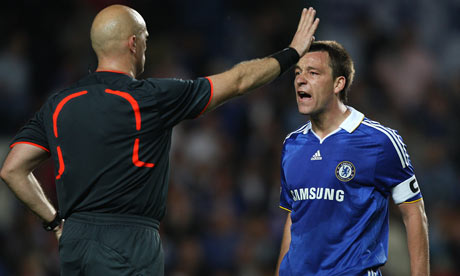The John Terry trial has had the press and radio in a fluster, not so much - curiously - because of the racism, but because they find the 'industrial' language used by those horrible footballers truly shocking. How could it possibly remain 'the beautiful game'? moans Colin Shindler on radio, heading off to the virgin desert.
My first thought is that those who worry about this should listen to the crowd sometimes. Not just now, but at any time at all. They might consider sitting on a bus or a train. Better still they might listen to themselves and their own class or gender (either).
Having got so far I am unsure whether to go for asterisks or the full four-letter heavy club. Fuck or f***? There! I've done it once now so I could go on but, for sheer gymnastic pleasure, I'll tiptoe around the words.
I remember the shock caused in the early 60s by the word 'bloody' in Till Death Us Do Part. A little later there was Kenneth Tynan sneaking in the Big F on BBC3 in 1965. A thumbnail history of obscene language is provided by The Laughing Policeman, and it might be noted that his first exemplar is the Prince of Wales in 1900. The Guardian, being a cutting edge newspaper, has taken a particular interest in the issue with, for example, an article by Mark Lawson here and another, by Jonathan Margolis, here. Over the years, it seems, the 'bad' word has become not only critically respectable but is now an almost obligatory signifier of dramatic realism. To paraphrase Dylan, integrity doesn't talk, it swears.
Swearing, as most people agree, is not so much about the meaning of 'offensive' words as about their shock value. But when the words are in common use the shock is reduced. Shock is the small change with which hypocrisy tips its servants: a pittance brandished as a gesture. For that reason I am not tempted to pay much attention to it.
Humankind has always had a small stock of verbal explosions that constantly needs replenishing. Some cultures are distinctly recognisable by the sheer range of of imprecations. Hungarians like to think they are well endowed in that respect.
Apart from those necessary verbal explosions of anger and frustration people might still swear for various reasons:
1. For effect ('Look at me, I'm a truly unshockable person'). Response: Of course you are, FFS!
2. As affectation ('I may be middle class but I have street presence) Response: Yeh, cool.
3. For purposes of aggression. Response: confrontation or backing down
(It's the last you want to worry about. A man sticking his face into yours and bellowing, or indeed hissing, imprecations is a hair's breadth from punching you. Even then it is not so much the words themselves as the way they are uttered that is the clue.)
Some say swearing is misogynist because some insults are directed at individuals' mothers. Not so, I'd argue. It is precisely because the mother is the most sacred being that she is being picked on. The mother is the real religious taboo. Nobody bothers with fathers. Has anyone seen a painting of Joseph being transported to heaven with a choir of angels? I thought not. It is the profaning of the sacred that is the point.
On the receiving side then, besides actual crime, there remains that hoary old tart: offence. People like to put on an offended air about almost anything: generally they are making a grab for the moral high ground.
This too will pass.


4 comments:
Spot on, George - and very quick ! Amazed that 'bad language in football' has only just been noticed: current commentators should have been on the terraces at Watford FC in the early 70s if they think it's a novel phenomenon.
Watford, Luton, Stamford Bridge, Highbury. Louis MacNeice:
Louis MacNeice - Conversation
Ordinary people are peculiar too:
Watch the vagrant in their eyes
Who sneaks away while they are talking with you
Into some black wood behind the skull,
Following un-, or other, realities,
Fishing for shadows in a pool.
But sometimes the vagrant comes the other way
Out of their eyes and into yours
Having mistaken you perhaps for yesterday
Or for tomorrow night, a wood in which
He may pick up among the pine-needles and burrs
The lost purse, the dropped stitch.
Vagrancy however is forbidden; ordinary men
Soon come back to normal, look you straight
In the eyes as if to say 'It will not happen again',
Put up a barrage of common sense to baulk
Intimacy but by mistake interpolate
Swear-words like roses in their talk.
I must become more familiar with the poetry of Louis MacNeice, it appears. He has perhaps been too long overshadowed by Eliot and Auden - today he speaks more clearly to our situation, if this poem is a typical example of his work.
Thank you George - diolch yn fawr
Jeni
The judicious use of 'bad' words or 'industrial language' can be very funny, as for example, in Father Ted or Rab C Nesbitt. Unfortunately the average user of such vocabulary has not the finesse of the scriptwriter. Yesterday I went to see the Globe on Tour - go back to Shakespeare for the dirty jokes!
It so often depends on the context.
WANTED TO BUY. Small dog: Mustn't bark or bite; must feed on broken glass and shit diamonds.
Goethe c. 1812
Post a Comment